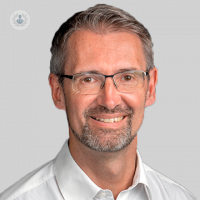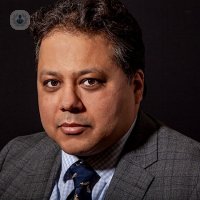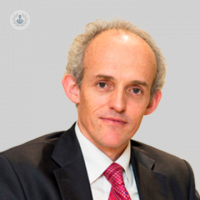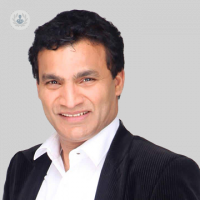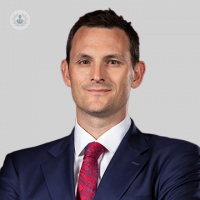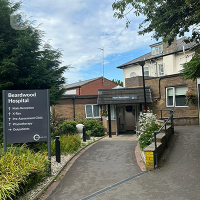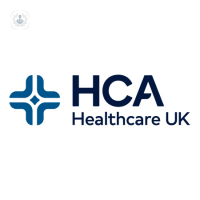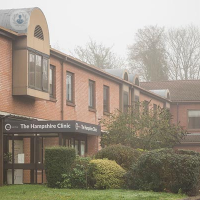What is a discectomy?
Discectomy is a surgical procedure to partially or completely remove a spinal disc. The spinal disc is the cushion that separates the vertebrae, the bones that make up your spine.

Why is a discectomy performed?
A discectomy is usually performed to treat a herniated spinal disc. A spinal disc hernia means that some of the fluid has leaked out and has begun to press on the surrounding nerved. This can produce pain in the back that spreads to the legs and causes intense weakness in the muscles.
A discectomy is carried out when more conservative measures, such as physiotherapy and steroids, have failed to alleviate the pain and weakness from the hernia. Where a discectomy is performed to correct problems caused during a previous discectomy, it is known as a revision discectomy.
What happens during a discectomy?
A discectomy is generally carried out under general anaesthesia and may require an overnight hospital stay. To access the herniated disc, surgeons may either perform open surgery or make use of keyhole techniques (also known as a microdiscectomy). In some cases it may be necessary to remove part of the vertebra to get access to the herniated disc.
The aim is to remove only the part that is herniated, but in some cases the surgeon may need to remove the whole disc. If the whole disc is taken out the surgeon will need to fill the space with bone, which could come from a donor or could be made from synthetic material.
Preparing for discectomy
No special preparation for discectomy is required. You will, however, need to inform the doctor of any medications you are taking including herbal supplements. You will also need to see the anaesthetist prior to the operation to assess your suitability for general anaesthetic.
Aftercare
Recovery after discectomy is usually rapid. You will usually be asked to get up and walk as soon as the anesthesia wears off and often you can return home the same day of the surgery.
At first you may feel pain, weakness or numbness, which should disappear during the next few weeks. For an optimal recovery, it is recommended to walk as often as possible, and your rehabilitation program should include physiotherapy and exercises to carry out at home.
As for returning to work, if it is in an office, you can return after two or four weeks; on the other hand, if it is a job that requires manual labour, it can usually be resumed after four to eight weeks.
12-17-2015 05-10-2023Discectomy
Mr G Michael Hess - Orthopaedic surgery
Created on: 12-17-2015
Updated on: 05-10-2023
Edited by: Aoife Maguire
What is a discectomy?
Discectomy is a surgical procedure to partially or completely remove a spinal disc. The spinal disc is the cushion that separates the vertebrae, the bones that make up your spine.

Why is a discectomy performed?
A discectomy is usually performed to treat a herniated spinal disc. A spinal disc hernia means that some of the fluid has leaked out and has begun to press on the surrounding nerved. This can produce pain in the back that spreads to the legs and causes intense weakness in the muscles.
A discectomy is carried out when more conservative measures, such as physiotherapy and steroids, have failed to alleviate the pain and weakness from the hernia. Where a discectomy is performed to correct problems caused during a previous discectomy, it is known as a revision discectomy.
What happens during a discectomy?
A discectomy is generally carried out under general anaesthesia and may require an overnight hospital stay. To access the herniated disc, surgeons may either perform open surgery or make use of keyhole techniques (also known as a microdiscectomy). In some cases it may be necessary to remove part of the vertebra to get access to the herniated disc.
The aim is to remove only the part that is herniated, but in some cases the surgeon may need to remove the whole disc. If the whole disc is taken out the surgeon will need to fill the space with bone, which could come from a donor or could be made from synthetic material.
Preparing for discectomy
No special preparation for discectomy is required. You will, however, need to inform the doctor of any medications you are taking including herbal supplements. You will also need to see the anaesthetist prior to the operation to assess your suitability for general anaesthetic.
Aftercare
Recovery after discectomy is usually rapid. You will usually be asked to get up and walk as soon as the anesthesia wears off and often you can return home the same day of the surgery.
At first you may feel pain, weakness or numbness, which should disappear during the next few weeks. For an optimal recovery, it is recommended to walk as often as possible, and your rehabilitation program should include physiotherapy and exercises to carry out at home.
As for returning to work, if it is in an office, you can return after two or four weeks; on the other hand, if it is a job that requires manual labour, it can usually be resumed after four to eight weeks.
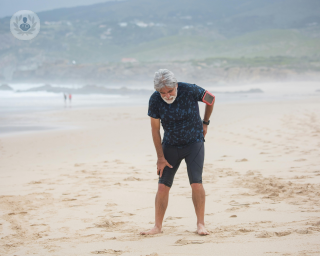

Disc and back pain: A neurosurgeon's perspective
By Mr Samih Hassan
2024-12-30
Disc and back pain are common conditions that can significantly impact daily activities and overall quality of life. Understanding the relationship between these conditions and neurosurgery is crucial for patients seeking effective treatment options. Leading consultant neurosurgeon Mr Samih Hassan provides comprehensive information about disc and back pain from a neurosurgical perspective in this article. See more
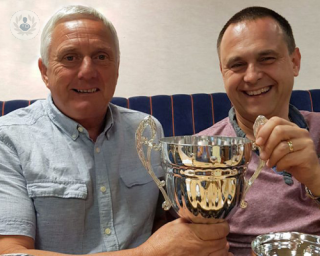

180-degree turnaround for darts player after sciatica surgery
By Mr Iqroop Chopra
2024-12-29
David Cheal, a keen darts player with severe symptoms of sciatica that were so bad, found himself struggling with everyday tasks such as boiling the kettle - while his passion for the sport was understandably dampened. Read how esteemed consultant neurosurgeon Mr Iqroop Chopra played a significant part in bringing Mr Cheal back to full health, so much so that he went on to become a darts champion on the international stage. See more
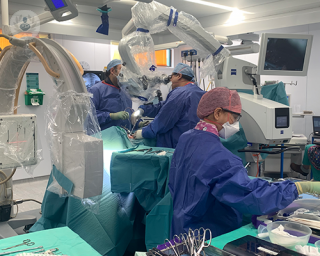

Anterior cervical discectomy and fusion (ACDF) explained by a specialist
By Mr Dimpu Bhagawati
2024-12-29
Learn from a leading spinal surgeon about the ACDF procedure. Mr Dimpu Bhagwati explains who can benefit, how it's performed, the recovery process and more. See more
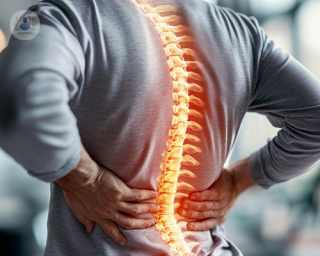

Discectomy: All about the procedure
By Mr Caspar Aylott
2024-12-29
When back pain or related symptoms are caused by a herniated disc that is pressing on nearby nerves, a surgical procedure known as a discectomy may be recommended. Here, Mr Caspar Aylott, renowned consultant spinal surgeon, provides an expert insight into a discectomy, answering key questions regarding surgery, recovery expectations, and success rates. See more
Experts in Discectomy
-
Mr Dimpu Bhagawati
Orthopaedic surgeryExpert in:
- Discectomy
- Kyphoplasty
- Minimally invasive spinal surgery
- Sciatica
- Spinal surgery
- Scoliosis
-
Mr Caspar Aylott
Orthopaedic surgeryExpert in:
- Degenerative disc disease
- Discectomy
- Minimally invasive spinal surgery
- Spine fracture
- Back pain
- Sciatica
-
Mr Mangattil Rajesh
Orthopaedic surgeryExpert in:
- Back pain
- Neck pain
- Sciatica
- Minimally invasive surgery herniated disc
- Slipped disc
- Discectomy
-
Mr Dan Plev
NeurosurgeryExpert in:
- Spinal surgery
- Kyphoplasty
- Minimally invasive spinal surgery
- Discectomy
- Sciatica
- Radiofrequency denervation
-
Mr Alex Torrie
Orthopaedic surgeryExpert in:
- Spondylolisthesis
- Spinal surgery
- Sciatica
- Discectomy
- Lumbar spinal surgery
- Spinal cord compression
- See all

The Beardwood Hospital - part of Circle Health Group
The Beardwood Hospital - part of Circle Health Group
Preston New Rd, Blackburn BB2 7AE
No existe teléfono en el centro.
By using the telephone number provided by TOP DOCTORS, you automatically agree to let us use your phone number for statistical and commercial purposes. For further information, read our Privacy Policy
Top Doctors

The Princess Grace Hospital - part of HCA Healthcare
The Princess Grace Hospital - part of HCA Healthcare
The Princess Grace Hospital, 42-52 Nottingham Pl, W1U 5NY
No existe teléfono en el centro.
By using the telephone number provided by TOP DOCTORS, you automatically agree to let us use your phone number for statistical and commercial purposes. For further information, read our Privacy Policy
Top Doctors

Hampshire Clinic - part of Circle Health Group
Hampshire Clinic - part of Circle Health Group
Basing Rd, Old Basing, Basingstoke RG24 7AL
No existe teléfono en el centro.
By using the telephone number provided by TOP DOCTORS, you automatically agree to let us use your phone number for statistical and commercial purposes. For further information, read our Privacy Policy
Top Doctors
-
The Beardwood Hospital - part of Circle Health Group
Preston New Rd, Blackburn BB2 7AE , BlackburnExpert in:
- Cancer
- Cardiology
- General Surgery
- Orthopaedic surgery
- Dermatology
- Diagnostic Imaging
-
The Princess Grace Hospital - part of HCA Healthcare
The Princess Grace Hospital, 42-52 Nottingham Pl, W1U 5NY, Central LondonExpert in:
- Cancer
- General Surgery
- Orthopaedic surgery
- Robotic Surgery
- Intensive care
- Sports Medicine
-
Hampshire Clinic - part of Circle Health Group
Basing Rd, Old Basing, Basingstoke RG24 7AL, BasingstokeExpert in:
- Vascular Surgery
- Cardiology
- Minimal access surgery (keyhole surgery)
- Endocrine Surgery
- Maxillofacial Surgery
- Neurological spinal surgery
- See all
- Most viewed diseases, medical tests, and treatments
- Alzheimer's disease
- Cluster headaches
- Tension headache
- Chronic headache
- Ulnar nerve entrapment
- Peripheral nerve block
- Peripheral neuropathy
- Migraine
- Joint pain
- Lumbar herniated disc
